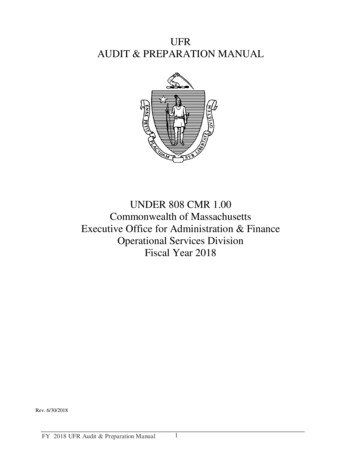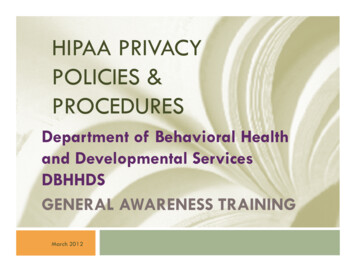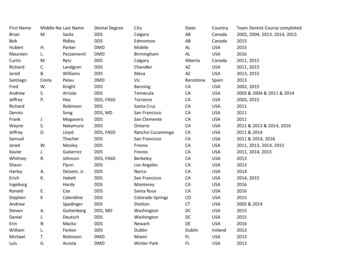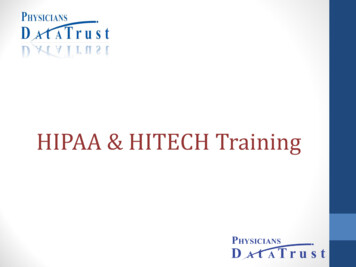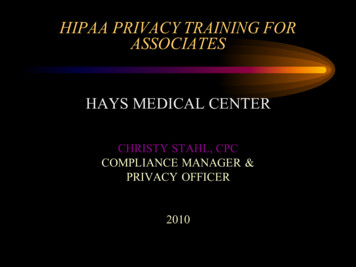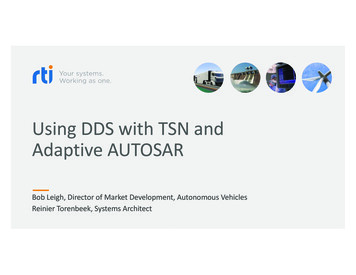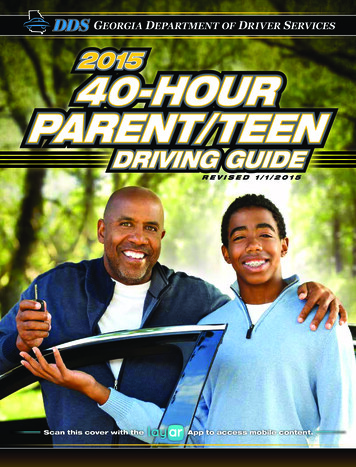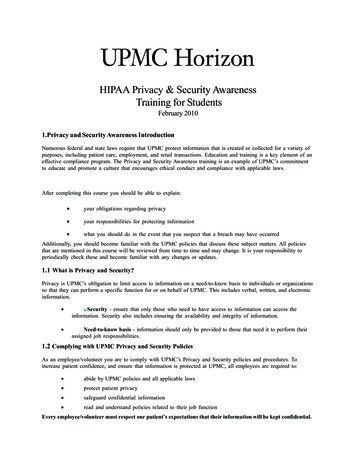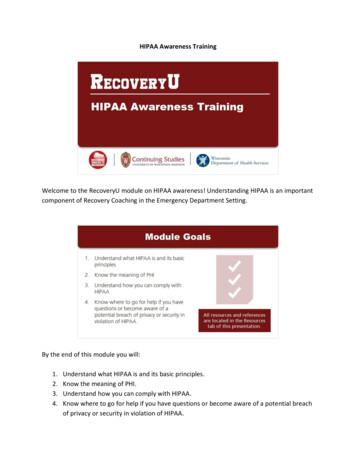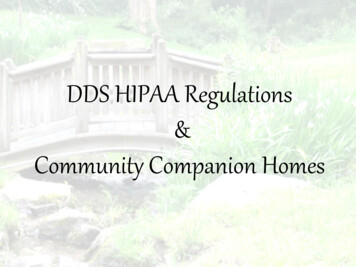
Transcription
DDS HIPAA Regulations&Community Companion Homes
What is HIPAA ?HIPAA stands for the Federal Law entitled “The Health Insurance Portabilityand Accountability Act of 1996. The law has established privacy standards forhealthcare information for all citizens.What is Protected Health Information?Protected Health Information or PHI is any information, oral or in form, thatis created or received by a provider, a health plan, public health authority, employer, lifeinsurer, school or university, or health care clearinghouse that relates to the past,present, or future, physical or mental health, or condition of an individual.What information does HIPAA protect?Protected information includes any individuals:Health (Diagnosis)Provision of Care ( Services Received)Payment of ServicesInformation which identifies the person (Names, address, SS#)
What disclosures are permitted ?Disclosures of PHI may be made for reasons such as:Treatment (for day program, residential services, clinical services)Payment (billing for services)Health Care Operations ( quality assurance & program oversight)How are my designees and Direct Contact Persons affected?The CCH Provider is responsible for training and insuring that any designee ordirect contact person to whom they provide an individual’s PHI, agrees to the samerestrictions and conditions that apply to the provider with respect to PHI. Direct Contactpersons include, Home Health Aides, mentors, persons providing recreational supports, andvolunteers.What are my privacy obligations?See HIPAA examples to Community Companion Homes on Next Slide
Communication with:Purpose:Permitted?:DDS Case Manager, CCH Manager, Private agency staff, DDS orprivate agency respite staff, CCH DesigneeTreatmentYesCCH Direct ContactPerson is involved in DDSIndividual’s supportYesDDS Quality Management (licensing / quality monitors)Treatment, Quality Assessmentsand ImprovementYesDDS Health Service Providers (MD, Nurse, Psych)TreatmentYesDDS Business officePaymentYesYesSchools, Education ProgramsTreatmentYesYesCommunity Education Programs, Recreation ProgramsPermission to participateYesYesAdult day programsTreatmentYesPrivate EmployerAnyNo **Private agency for Community ReferralPlacement and transitionNo**Emergency Services ( EMT, Ambulance, Hospital)TreatmentYesEmergency Services Business officePayment, Quality ImprovementYesCommunity MD, Dentist, Nurse, HHA, RehabTreatmentYesCommunity Provider’s Business officePayment, Quality ImprovementYes** Except for disclosure permitted with guardian authorizationMinimum Necessary:YesYesYes
Communication with:Purpose:Permitted?:Minimum Necessary:Pharmacy StaffTreatment, PaymentYesYesPharmacy StaffConversation unrelated to filingand RX or OTCNoLaw EnforcementTreatmentYesLaw EnforcementCourt orders, Subpoena,Warrants, SummonsLaw EnforcementLocate suspect or materialwitnessLaw EnforcementCALL DDSYesYesMissing Person ( CCH Individual)YesCALL DDSYesLaw EnforcementReport a crime or victim of acrimeYESCALL DDSDDS Abuse Investigation DivisionVictim of Abuse or NeglectYesDepartment of Children and FamiliesTreatment, Payment, QualityImprovementYesDepartment of Social Services or Social SecurityEntitlementsYesDepartment of Public HealthAnyAttorney or LawyerCourt Appointed GuardianAttorney or LawyerAny other purposesMember of Individual’s familyGuardian, involved in supportYesDDS Individuals, relatives, friends, clergy, other CCH providersAnyNoYesYesCALL DDSYesNo**Yes
DDS Community Companion HomesInitial Training
DDS Mission Statement:The mission of the Department of DevelopmentalServices is to partner with the individuals wesupport and their families, to support lifelongplanning, and to join with others to create andpromote meaningful opportunities for individualsto fully participate as valued members of theircommunities.
Overview of DDS Services:The Department of Developmental Services (DDS) has a long history in the State of Connecticut. As early as 1917, services for individuals withintellectual disability were largely provided at the Mansfield Training School until 1940 when the Southbury Training School wasopened. Eventually these facilities, along with “Regional Centers” established in the 1960’s, were overseen by the Office of Mental Retardation,a division of the State Department of Health.In 1975 the Connecticut General Assembly established an independent Department of Mental Retardation (P.A. No. 75-638). The departmenthas been a department in the executive branch, headed by a Commissioner appointed by the Governor, since that time. In 2007, thedepartment changed its name from the Department of Mental Retardation to the Department of Developmental Services. This change reflectsthe mission and commitment of the department to serve individuals eligible for services with the utmost respect and dignity. DDS Services arenot an entitlement. To be eligible for services, a person must be a resident of CT, and have an intellectual disability as defined in ConnecticutGeneral Statutes Section 1-1g OR have a medical diagnosis of Prader-Willi Syndrome (PWS), which is a neurobehavioral genetic disorder thatmust be diagnosed by a physician. People who have a diagnosis of autism spectrum disorder but do not have intellectual disability may beeligible for services from our Division of Autism Spectrum Services. Funding must be available for services requested.Overview of Regional Services:Within the region, DDS holds the responsibility of providing case management services, quality assurance & licensing reviews, as well asproviding Program Management to both public (state supported) and private (private agency supported) CCH’s. Payments made to CCHProviders also come directly from the DDS Regional offices.
CCH Team Member RolesTech: The person with which the licensee will have the most frequent contact is the Tech (private agencies) , orResource Compliance Coordinator (DDS), who visits on a monthly basis. During the visit, they will review allpaperwork in the home, behavioral, medical, financial, etc. They will also review the physical plant requirementsto ensure the home remains in compliance with state regulations.Case Manager: The Case Manager is assigned by DDS, and provides for the coordination and oversight ofservices. They are the liaison between the Region, Guardian, Day Program etc. They, with the assistance of theteam, develop the Individual Plan and help to identify strengths, as well as areas where additional support maybe necessary.Nurse: There is a Nurse assigned to every individual supported in the home. They provide the oversight for theperson’s medical needs. They will train the CCH Provider on the medical issues the person may have. They alsoreview all documentation from medical appointments, and provide guidance to the licensee as to what followup may be necessary. The Nurse is also made aware of any illnesses, or injuries the person may have .
Roles Cont.Behaviorist: If the individual placed in the home has any behavioral concerns, there will be a behaviorist as part of the team.The role of the Behaviorist to get to know the individual and the rationale behind the behaviors they exhibit. They will thenwork with the licensee, and the individual to prepare a plan with positive strategies for coping with challenging behaviors.Role of the CCH Provider: The role of the CCH Provider is to be the primary caregiver of all individuals placed in the home.They are responsible for medical, financial, behavioral , etc. oversight of the individual. They are responsible forcoordinating whatever care the individual needs, and ensuring they receive it. They are also responsible for teaching theindividual, and ensuring opportunities for community integration. Some of the documentation that will be kept by theprovider includes:Follow Fire Safety Inspection reportPetty Cash & Bank Account LedgerBehavioral data – if applicableMedical appointment recordsOut of bed dates – reported to DDS for any days the individual did not sleep in their beds, i.e. vacations, family visits,hospital stays, etc.You will also maintain on file:Individual PlanQuarterly ReviewsLevel of NeedSpecialized ReportsCurrent DDS Safety Alerts & AdvisoriesCorrespondence with DSS & SSAIndividual inventoryPay stubsBank statements
Myths about the CCH ProgramProgram is unsupervised or not as supervised as other living arrangements: The CCH Program is supervised ona variety of levels. It is supervised through monthly visits by the CCH Tech, quarterly visits by the CCH Nurse &Behaviorist, Case Manager oversight through quarterly meetings , as well as State oversight through yearlylicensing.The Natural Family is no longer involved: Once an individual is placed in a CCH, does not mean that thebiological family can no longer be involved. The role of the individual’s family remains the same. The providerwill work with the family to maintain family connections and relationships. The individual is allowed to go homeand stay with the family whenever the family desires. In some instances, the family continues to be involved withtaking the individual to medical appointments, or out for recreational activities.The CCH Program is a great “job opportunity” to get rich: Being a CCH Provider is not a job, nor are youconsidered an employee. Any CCH monies coming into the home cannot be the sole source of income in thehome. Difficulty of care money is given to the provider for the care of the individual.
Homes for ChildrenPermanency Planning: DCF must file a permanency plan with the child’s best interests in mind. This plan could include thegoal of revocation of commitment and reunification of the child with the child’s parents, transfer of guardianship,termination of parental rights and adoption, long term foster care with a relative licensed as a foster parent of another typeof planned permanent living arrangement ordered by the court. If a child is placed in a Community Companion Home, thechild will be followed by both DCF and DDS until the child ages out at the age of 21.Subsidized Adoption: The subsidized adoption program was created to facilitate the adoption of children in DCF care andin the care of private CT licensed agencies that place children with special needs. Subsidized adoptions achieve permanencyfor children who might otherwise have to remain in foster care. The majority of children placed by DCF for adoption receivesome kind of adoption subsidy benefit. The CCH program does not allow for adoptions within this model. Currently, youcannot be the guardian or parent of someone living in your home that you are being paid as a CCH licensee to care for. Thisis considered a conflict of interest.Educational Rights: You will be expected to ensure that the child under your care attends schools as required by law and ashis/her right. Most children have an individualized education plan that projects graduation at the end of the school year inwhich they turn 21. DDS has Transition Advisors that will work alongside the case manager to help coordinate thetransition from high school into the working world.Important Relationships: As a CCH licensee you will have an obligation to ensure that the child maintains as relationshipwith their family of origin or other important persons if so desired and there is no court ordered or DCF mandatedsanctions in place. If there are therapeutic contraindications, this should be discussed with the child’s DCF case worker andthe CCH team immediately.For more information, visit www.ctfosteradopt.com
Homes For AdultsUse of Generic Services: Individuals will be served for medical, behavioral and social needs throughcommunity services. They will utilize community doctors, walk ins, ER’s etc., that any other members of thecommunity use.Age Appropriate Activities: Within the CCH, it is expected that providers will engage the individual(s) intheir care with age appropriate activities, and opportunities to be present in community activities. Individualsshould have the opportunity to engage in religious, cultural, social and recreational activities of their choosing.Activities should be tailored to their age group. i.e. individuals who like art should not attend a kids coloringprogram at the library, however they may enjoy a painting class offered through the town’s continuingeducation program.
Developing & Maintaining Friendships: The CCH provider is responsible for assisting the individualin maintaining relationships that are important to the individual in their care. To the best of their ability, theyshould utilize mentors, designees, etc. who can assist with maintaining connections. They are also responsiblefor helping the individual develop friendships with peers, and community persons, so that their circle offriends does not only include the licensee and their family.Self Advocacy: The individual placed in a CCH should be encouraged to be an active participant in all thatgoes on in their lives. They should be encouraged to make choices, and learn to advocate for what they want.The CCH Provider is responsible for facilitating the opportunities for the individual to make choices, andexercise their rights, even if it’s not what the provider themselves might choose. CCH Providers are alsoencouraged to provide opportunities for the individual to attend self advocacy groups where they can learn tobe more active in what goes on in their lives, rather than allowing others to make all the decisions for them.Employment Opportunities: See Day Services for Adults
Day Services for AdultsSUPPORTED EMPLOYMENT - These include supports to help individuals work as a paid employee in work settings that also employ people withoutdisabilities. These services assist individuals find and apply for jobs, and offer job coaching support to people once work is secured. This service includesindividual and group supported employment. This service is designed to provide support and supervision but is not intended to provide ongoing long term 1:1support to help a person complete their work activities.GROUP EMPLOYMENT - These include sheltered workshops and day support options. These services are provided in a facility-based program that focuses ondeveloping meaningful skills in the area of work, socialization and community participation.INDIVIDUAL DAY - This waiver service includes individually tailored supports that help consumers gain or maintain skills to participate more fully andproductively in work, leisure or community activities. This may include the development of independent functioning skills, relationship skills, exploring jobinterests or retirement programs. It can also provide funds for staff supports for individuals who have their own businesses.DAY SERVICE OPTION -Day Support Options (DSO). Supports to participants that lead to the acquisition, improvement, and/or retention of skills and abilitiesto prepare a Participant for work and/or community participation, or support meaningful socialization, leisure, and retirement activities. Supports include thedevelopment, maintenance or enhancement of independent functioning skills including but not limited to sensory-motor, cognition, personal grooming,hygiene, toileting, assistance in developing and maintaining friendships of choice and skills to use in daily interactions; the development of work skills;opportunities to earn money; opportunities to participate in community activities.Retirement Services - DDS does not have one support category called Retirement Services. Individuals who are elderly and choose to no longer want to work areable to attend a DSO program. The DSO program may incorporate the participant in the activities of all the other participants, may be a program that isdesigned around elderly individuals or may be a combination of both where the individual attends a community senior center for part of the time.DDS has developed a new support category called Senior Supports. It is waiting for approval from CMS. This service is typically utilized when two or moreindividuals in a group or home or CCH choose not to participate in a community day program. These individuals are elderly or have medical conditionsand/or physical disabilities and do not want to get up early in morning to drive to a group day program. The individuals choose the activities they want toparticipate in or the skills they want to require. Activities can occur in the community or in the home.
PaymentRent is paid to the licensee by the individual(s) in their home. A housing agreement will be signed for each individual in thehome. Rent is a fixed amount of 500 and is non negotiable. This covers the cost of someone living in a room in your home.Mid month, a check from DDS will come based on the LON of the individual. This is considered a Difficulty of Care payment.This payment covers all of the service needs of the individual. Rates have increased to cover this change in funding, as seen inthe table below.
Emergency Notification Procedures for Public CCH’s
What is HIPAA ? AA stands for the ederal aw entitled "The ealth nsurance ortability and Accountability Act of 1996. The law has established privacy standards for . intellectual disability were largely provided at the Mansfield Training School until 1940 when the Southbury Training School was opened. ventually these facilities, along with .
